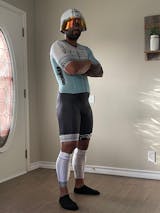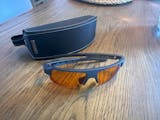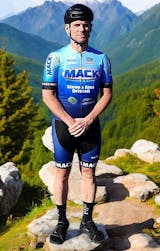Amanda Stevens — Family, Health, then Sport
Amanda Stevens-Sadler’s professional legacy is remarkable. She was a two-time Olympic Trials qualifier in 2004 and 2008, a leading competitor on the ITU circuit, and in 2013 she won her first Ironman event in Brazil. She was first out of the water at nearly every race she entered. Amanda turned pro in 2003, completed medical school in 2006, broke the nine-hour mark in 2015, and now spends her time as a devoted mom, physician, and coach all during a global pandemic. As COVID-19 spread to affect daily life, Amanda also faced a new paradigm of coaching without races, advocating for Personal Protective Equipment (PPE) during the supply shortage, and continuing to treat her patients through it all. Thanks to her long-standing relationship with Rudy Project, she was able to alleviate this one concern and work with increased confidence through it all.
Amanda’s career as a triathlete is exceptional, but so is her professional career. She is a medical doctor who continues to grow and enhance her skills as a clinician. She planned to take this year to complete a sports medicine fellowship. As an endurance athlete and doctor, Amanda is quite familiar with treating chronic and overuse injuries, but this was an opportunity she had planned to get more comfortable with – treating acute injuries. However, 2020 has been far from what any of us expected.
Her sports medicine fellowship typically would have had her on the sidelines and in locker rooms at a variety of sporting events right now, but there is just not a lot of sport going on. Schools like the University of Oklahoma, which is closest to home for Amanda, are playing. However, COVID-19 regulations are strict, so she hasn’t been able to join their games. For the smaller colleges and high schools that are still having regular seasons, Amanda would have been in locker rooms treating injuries and developing return-to-play plans, but instead she is completing COVID-return-to play plans with the athletes.
Why Sports Medicine Now?
Her training as a doctor has been shaped in part due to her own athletic career and her own missed diagnoses. Amanda dealt with gastrointestinal issues throughout much of her early career. She knows that her career as a triathlete could have been different had those issues been solved earlier and treated correctly.
Amanda’s focus has been on primary care and functional medicine. Functional medicine looks at the root cause of a disease from the cellular level to understand its influence on the whole system. She’s hoping to use this knowledge — with the skills of preventive care and wellness refined during this fellowship — to become a more well-rounded clinician. After this fellowship, Amanda hopes to continue her work by helping other athletes become more efficient by evaluating things like their metabolism and known muscular weak spots.
As if being busy as a doctor wasn’t enough, Amanda coaches several athletes and is a mom of two. She has a three-year old and almost nine-month old. Not one to slow down, she swam up until they were born and resumed quickly thereafter. For much of the past decade Amanda has balanced her career as a medical doctor with her career as a professional triathlete and coach. If you talk with Amanda Stevens, you’ll hear this phrase about her philosophy as a working mom, athlete, and coach. “Family first, health second, sport third.” And now more than ever, this philosophy highlights the reality that most athletes have these priorities out of order. For many, sport is first and foremost.
Now that sport (specifically competing) have been canceled, many athletes are using this time to re-evaluate and get their priorities back in order. Her message this year, despite the letdowns of canceled races, is that 2020 training can be a “blessing in disguise” for years to come. She’s emphasized to her athletes that this is the year to build an incredibly healthy, strong base. Having a solid training foundation builds endurance and provides the ability to ramp up as needed when races are back on the schedule with minimal injury risk.












